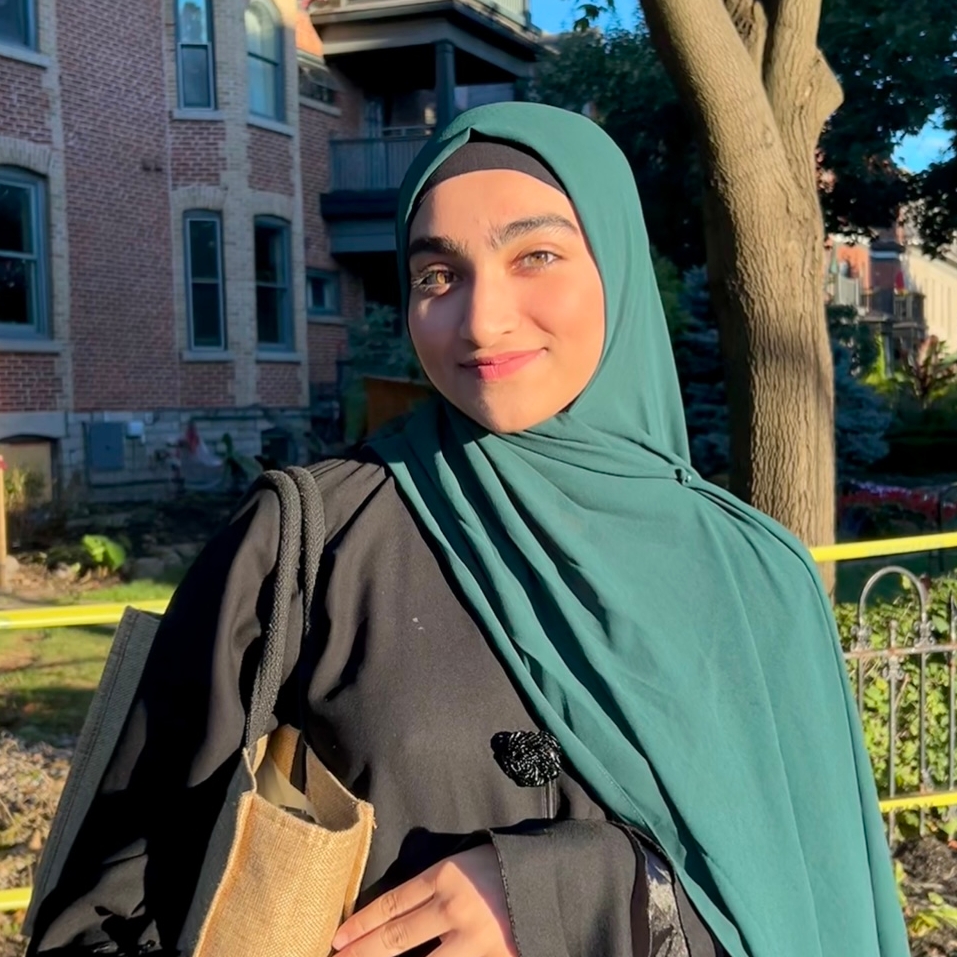Five Faculty of Arts students win Global Undergraduate Awards
The Global Undergraduate Awards (external link) (GUA) is a renowned international award programme that recognizes and celebrates the outstanding scholarly work of undergraduate students. Submissions are open to students from all institutions of higher education globally, making the GUA’s three award designations highly competitive.

2024 winners (from top left): Yerza Hussain, Bryson Landriault, Sebastian Neme, Anjali Singh, Hafsah Younus
Nominees anonymously submit their work, which undergoes a rigorous judging process by a panel of international academics, scholars, and industry experts. The top 10% of nominees are shortlisted as Highly Commended and are made eligible to receive the Regional designation or deemed the Global Winner. This year, the Faculty of Arts proudly celebrates five winning students; three have received Highly Commended, and two were recognized as Regional Winners in their categories.
Meet the winners
Yerza Hussain, English – Regional Winner, Social Sciences: Anthropology & Cultural Studies

“This acknowledgment supports my belief that scholarship can and should challenge conventional methodologies while maintaining intellectual rigour. Most importantly, this award represents the incredible mentorship I've received from professors who encouraged me to trust my academic instincts and pursue challenging questions.”
About Yerza Hussain:
Yerza Hussain’s work examines the intersection of critical theory, digital technologies, and social justice. During her English BA degree, she developed a keen interest in exploring how power structures manifest in contemporary society, particularly through technological and cultural apparatuses. Hussain has pursued graduate studies, focusing on the relationship between artificial intelligence, governance, and human rights. At Toronto Metropolitan University (TMU), she actively participated in undergraduate research initiatives and contributed to technological ethics and policy discussions.
Hussain’s winning paper:
My paper explores the spectral manifestations of power and ideology within cultural and social systems, examining how these invisible yet influential forces shape identity construction and material reality. Utilizing an innovative glossary format inspired by Tuck and Ree's work, the research investigates how dominant ideologies interpellate individuals while simultaneously exploring avenues of resistance. The study integrates theoretical frameworks from Althusser, Lugones, and Hooks to analyze how institutional structures maintain power dynamics and how marginalized perspectives can challenge these established narratives. Through this analysis, the research demonstrates that while spectral ideological forces significantly influence societal norms and individual identities, understanding and recognizing these forces creates opportunities for resistance and developing more inclusive narratives.
Hussain’s inspiration:
The genesis of this paper emerged from a convergence of theoretical frameworks I encountered in Professor Monique Tschofen's ENG 400 course and my ongoing interest in how technology shapes power dynamics in society. The course's exploration of critical theory provided a theoretical foundation that allowed me to examine how ideological structures manifest in traditional and digital spaces.
Bryson Landriault, Sociology – Regional Winner, Social Science: Sociology & Social Policy

“Receiving this award gave so much validation and proved that so much is possible if you put your mind to it! To other undergrads who want to nominate their work, reach out to professors and mentors in your life, ask for help, and be confident in the work you produce.”
About Bryson Landriault:
Bryson Landriault is a recent graduate of Sociology at TMU and is now in the first year of his BEd at York University. He has been fascinated with exploring topics on settler colonialism and decolonization, specifically observing how settler, non-Indigenous peoples understand these topics in Canada. Landriault was highly involved at TMU, working with Academic Accommodation Support and Writing & Learning Support.
Landriault’s winning paper:
This research paper used discourse analysis to investigate the sentiments of Canadian settlers on National Day for Truth and Reconciliation by assessing comments on the CTV-covered event in Ottawa in 2023, posted via YouTube. Understanding the gaps in colonization comprehension can inform policy and education decisions, such as improving formal education curricula and policies involving these topics.
Landriault’s inspiration:
I have always been interested in Canada's colonial history, but various TMU experiences encouraged me to explore this topic further. Professor Eva Jewell and Damien Lee were, in particular, foundational to my understanding of settler colonialism, Indigenous feminism, and decolonization. Additionally, my paper was originally written in the final year of my undergrad as part of my Sociology Capstone with Professor Dean Ray, who was extremely supportive in the writing process.
Sebastian Neme, Politics and Governance – Highly Commended, Politics & International Relations

“Write and do everything you do with intent and always find an angle or topic that interests you.”
About Sebastian Neme:
Sebastian Neme is a recent graduate of Politics and Governance at TMU with a minor in History. Neme resides in New York City, serving as a Legislative Fellow in the Community Engagement Division of the New York City Council.
Neme’s winning paper:
This paper examines the complex roles of women and girls during Sierra Leone's Civil War (1991-2002), challenging traditional narratives that frame them solely as victims or empowered fighters. It argues that female combatants, particularly those in the Revolutionary United Front, experienced a unique and gendered form of exploitation, embodying dual identities as both perpetrators and victims of violence. It highlights the broader implications for how gender dynamics should be integrated into discussions of conflict and peace worldwide, ensuring that all individuals' rights and experiences are acknowledged.
Neme’s inspiration:
This paper was written for a fourth-year politics course, POG 427: Women, War, and Peace, taught by Dr. Miriam Anderson. The course focused on women's roles in conflict zones, both historically and in the present. My knowledge and interest in West African conflict, particularly that of Charles Taylor's Liberia, inspired me to pursue this case.
Anjali Singh, Psychology – Highly Commended, Psychology

“Finding out that my paper won was an incredible moment of pride and joy. It felt like all of my hard work, and research had truly paid off. I am proud that this recognition has allowed my research to be shared with a broader audience, fostering awareness and necessary conversations surrounding this topic.”
About Anjali Singh:
Anjali Singh completed her BA in Psychology with a double minor in Criminology and English at TMU. She received the President’s Entrance Scholarship at TMU, which recognized her academic accomplishments, leadership qualities, and creative ability. Singh has also received awards from the Royal Canadian Legion Literary contests for multiple essays and poems and was the third-place winner of York University’s Essay Contest in 2019.
Singh’s winning paper:
My paper discusses the association of childhood maltreatment with the increased risk of Post-traumatic stress disorder (PTSD) and Complex Post-traumatic stress disorder (CPSTD). My research demonstrates that those who have experienced childhood maltreatment have a blunted cortisol (stress) response, and this response can lead to PTSD symptoms. Different forms of Childhood Maltreatment, such as sexual abuse and emotional abuse, can have different PTSD symptom outcomes based on the developmental stage of the child, demonstrating the depth of impact that childhood maltreatment has on a child’s body, not just emotionally but physiologically. My paper also discusses the neural pathway that mediates childhood maltreatment and PTSD, as well as the role of cognitive reappraisal and whether or not it is an adaptive or maladaptive strategy in dealing with PTSD or CPTSD symptoms.
Singh’s inspiration:
Taking the course CYC 201: Child Abuse and Neglect has equipped me with a comprehensive overview of the complexities surrounding these issues, from psychological to social impacts. Additionally, my passion for working with children has led me to get involved in community work and volunteer projects to help children develop academically and physically.
Hafsah Younus, Criminology – Highly Commended, Social Sciences: Sociology & Social Policy

“Having been recognized for my work is incredibly meaningful to me. It validates the hard work and dedication I put into exploring my interests, particularly in understanding complex social issues.”
About Hafsah Younus:
Hafsah completed her BA in Criminology at TMU. Currently, she is pursuing a Master’s in Criminology at the University of Ottawa. During her time at TMU, Hafsah gained valuable experience as a research assistant, contributing to various projects that explored critical issues in Criminology.
Younus’ winning paper:
This paper examines the pivotal role of trust in the dynamics of organized crime, terrorist groups and state institutions. It explores how trust facilitates cooperation and loyalty within these entities, influencing their operations and resilience. By analyzing case studies unique to each culture and state, the different methods of forming organized crime and terrorist groups are discussed and how this can be used to modify current policies to better regulate crime transnationally.
Younus’ inspiration:
This interest was sparked by taking a seminar class based on organized crime. Having a discussion in class regarding the role of trust and how it is undermined and under-researched led me to gain a deep passion for wanting to conduct research in this field.
Submit your work!
The Global Undergraduate Awards is committed to connecting students across cultures and disciplines. In June 2024, the GUA named TMU the winner of the Global University Leader Award (external link) —recognizing the university’s commitment to fostering innovative research, promoting interdisciplinary collaboration, and encouraging students to strive for global success.
Find out how to nominate your work for the 2025 award cycle. (external link)
Discover papers written by previous winners. (external link)